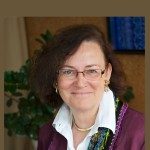Lien vers Pubmed [PMID] – 11941484
Hum. Genet. 2002 Apr;110(4):348-50
Usher syndrome (USH) is an autosomal recessive disorder associated with sensorineural hearing impairment and progressive visual loss attributable to retinitis pigmentosa. This syndrome is both clinically and genetically heterogeneous. Three clinical types have been described of which type I (USH1) is the most severe. Six USH1 loci have been identified. We report a Palestinian consanguineous family from Jordan with three affected children. In view of the combination of profound hearing loss, vestibular dysfunction, and retinitis pigmentosa in the patients, we classified the disease as USH1. Linkage analysis excluded the involvement of any of the known USH1 loci. A genome-wide screening allowed us to map this novel locus, USH1G, in a 23-cM interval on chromosome 17q24-25. The USH1G interval overlaps the intervals for two dominant forms of isolated hearing loss, namely DFNA20 and DFNA26. Since several examples have been reported of syndromic and isolated forms of deafness being allelic, USH1G, DFNA20, and DFNA26 might result from alterations of the same gene. Finally, a mouse mutant, jackson shaker ( js), with deafness and circling behavior has been mapped to the murine homologous region on chromosome 11.

